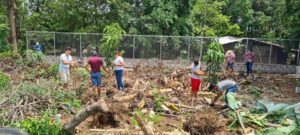“I only wanted to help campesinos read and write. I still can’t accept that I was tortured for this reason. I wasn’t armed.”
Esta historia se escribe en Español = This story is also written in Spanish here.
Editor’s Note: After our interview I read Neris’ 157-page testimony in the transcript of the July, 2002, civil case against the two Salvadoran generals who were the intellectual authors responsible for atrocities committed by their subordinates, including her unjust abduction and cruel inhumane torture. I was amazed how she managed to survive all the physical and psychological horrors, take the case to court while facing those two men day after day for a month, and win her country’s first human rights violations civil suit. Her offense? Being sensitive to the injustices of others and doing something about it by teaching peasants to count to 100!
While preparing for her court case, she was receiving treatment for her trauma at the Marjorie Kovler Center for Survivors of Torture in Chicago; she also founded and taught at ECOVIDA, a program focusing on history, environment, nutrition, and social justice issues for inner-city youth in Pilsen, a Chicago immigrant neighborhood.
Much has already been written about Neris, and we do not want to repeat it. Instead we ask her to share some tidbits of her life that she has NOT shared with other interviewers. As she reflects on the memories about her unconventional grandmother, she laughs a great deal. I include many of those memories here because it seems the wisdom, strength, and tenacity that her grandmother taught Neris continue to impact her life.
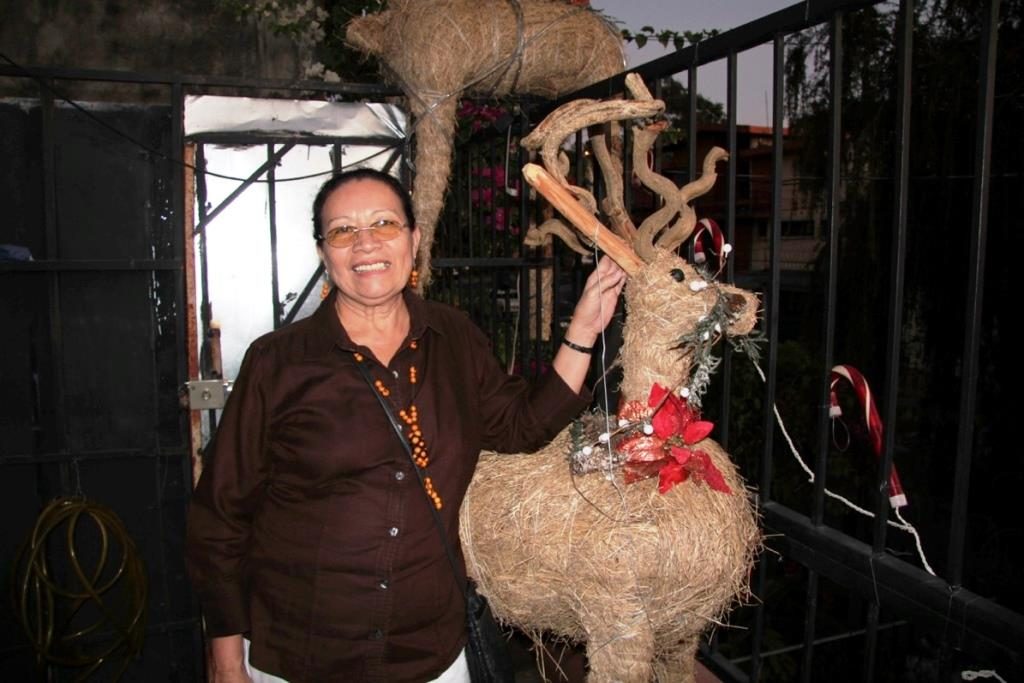
Neris Gonzalez
I was the third-born among twelve children living in a poor campesino community of San Nicolas Lempa in the San Vicente Department (in south-central El Salvador). I have two birth dates: my real one is on May 1955, (at 4 AM when the rooster crowed, according to my grandmother who delivered me) and my official one on record at City Hall on July 15. It was common at that time for groups of people to travel together to the City Hall to report births when transportation was available.
My father, whose own parents died leaving him an orphan when he was five years old, was from the city, and that is where he worked as a self-taught engineer on large projects including bridges. He returned to our rural home every two weeks. He never had the opportunity to attend school but insisted that all of us kids receive an education. Because he earned a bit more money than most in our community, when he came home, he would bring sweets such as candy and soda for all the neighborhood children. He also helped to support my mom’s brother’s and sister’s families who came to eat with us.
I lived under the regime of my maternal grandmother. Using strict discipline, she set and enforced all the rules we kids lived by. She taught us how to work by demonstrating a task one time, and we were expected to master it. We learned to watch very closely or risk the switch. All of us kids learned from an early age to be self- sufficient. By the time I was six or seven years old my grandmother taught me everything from culture to education to domestic housework. She taught me to wash corn, build a fire, wash dishes, wash my clothes on a washboard, change and care for the babies: including bathing them, getting the bottles ready, changing their clothes, and putting them to sleep. We got up at 4 AM, got the water ready, did the chores, walked two hours to school, walked two hours home after school, and then baked bread to sell. We could not return home until all the bread was sold. Then we ate dinner, filled up the water tanks, fed our siblings, and put them to bed.
Except for the poisonous snake that spent nights in her place, my grandmother lived alone next door to us in her own small house. (We kids refused to enter her house unless we knew that snake was outside.) She had beautiful flower and vegetable gardens. She had flowers of many different scents and all of the vegetables we used daily in the kitchen like tomatoes, green pepper, chile peppers, basil, mint, green beans, squash, etc. She planted many varieties of beans, vegetables, and trees. She raised hens, ducks, turkeys, and pigs. We kids fed and cleaned up the animals’ areas. Our community was rich in agriculture. We had rice, beans, cotton, sorghum, and sugar cane, coffee, and all kinds of fruit along the coastal region and the Chinchontepec Volcano of San Vicente.
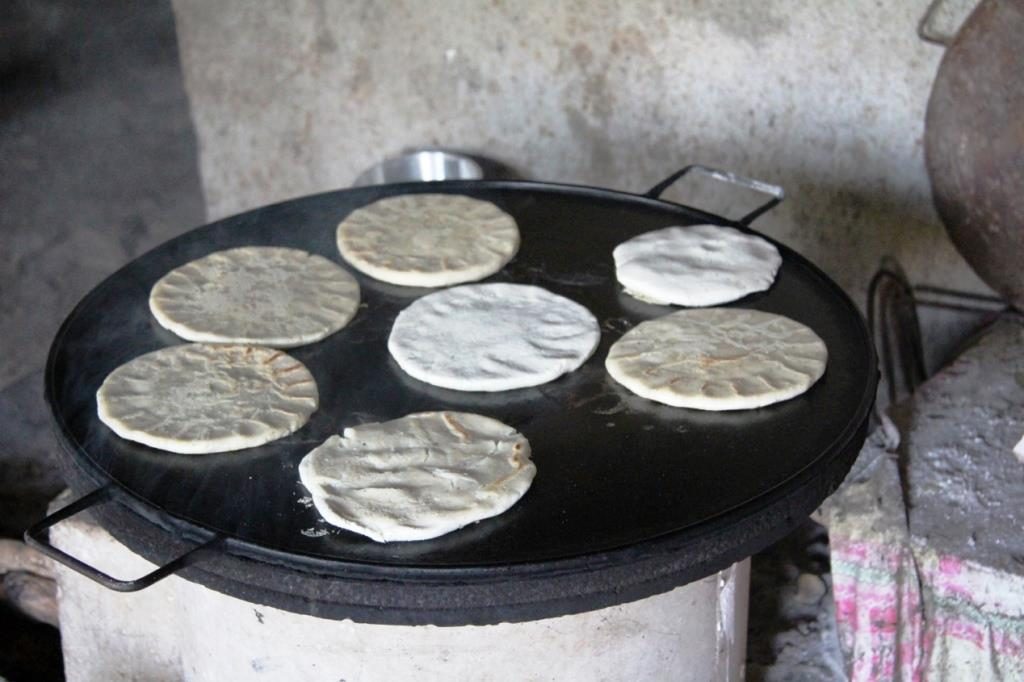
Producing corn and the making of tortillas were common tasks
Growing up in a rural village is the best quality of life you can have. I remember my grandmother trying to teach me how to grind corn with a stone, which I didn’t do well. She used to hit me with a rope as a result of my poor efforts to learn. I tried to make flawless tortillas like hers but the masa stuck to my hands and she would hit me again. I didn’t even like starting the fire because I was light-skinned and the flames made me turn red. It was no use complaining about cooking because protests only made things worse. Outside the house she taught us how to gather and cut firewood using a machete and how to split wood with an ax or hatchet. Being young teenagers with axes, we kids were embarrassed and would try to hide them when people drove by with questioning looks on their faces. My grandmother also taught us how to tie a bundle of firewood and carry it on top of our heads so it didn’t fall apart. It required no strength, simply skill. She taught us just once and then she did not help us. At the time I saw her method as scolding, but now I realize she was teaching us beautiful life lessons that we needed to learn. I appreciate and enjoy those memories now and find them of utmost value.
My grandmother had a favorite phrase which she could adapt to fit any situation to serve as either a threat or a motivation. “You sons of a thousand bitches. You have a brain; be creative because if you’re not creative, you’re lost in this world. We are poor because the government has us being poor, but we are rich in our minds, you sons of a thousand bitches.” Years later I realized this was a reflection of the love she had for us; she was encouraging us.
Grandmother did not allow us to be lazy. She forbade us from lying in a hammock. If she caught one of us lying in a hammock, a variation of the above speech began, “You sons of a thousand bitches. Are you tired or are you sick? “ We could never rest because there was always some chore to do. But she did make a small trapeze for us in the tree, and at night she allowed us to play with other kids.
Everything was organic because my grandmother understood the value of ecology and being a good steward of the land. Our house had a dirt floor, and we used the dirt we swept up from cleaning as organic fertilizer by adding leaves to it. She demonstrated the importance of enriching the soil with compost by making us take off our shirts on a hot day without protection from the intense sun. She explained how the mulch protected the soil and enriched its nutrients to fertilize the soil. If she caught us capturing butterflies in small puddles of water after rain or trapping birds, she whipped us for not allowing the natural cycle of life to continue.

In our community there were four women who served as parteras (midwives.) My grandmother was one of them. She delivered all twelve of us kids and to this day none of us has ever been treated in the hospital. I recall her taking her bowl and candle wherever someone was being born. She also used traditional medical healing by using natural substances. Often on Sundays people brought her their children who had gastro-intestinal illness or evil eye (Many in El Salvador hold the belief that a malevolent glare “evil eye” causes illness and misfortune) for healing, and she would turn them upside down to cure them.
Our family owned a small parcel of land as many other families in our town did. The oligarchs (large landowners) who lived on haciendas tried to make us think we were poor. We were poor materially, but we were not poor in our minds. The Lempa River had pure and abundant water and had different types of fish, clams, and shrimp. There was an island in the middle of the river and we also had mountain with trees that gave us shade and fruit year-round. We always had something to eat.
My mother was a country girl and a housewife. She did house work and my dad worked as self-taught engineer. He didn’t know how to read or write but he was a mathematician and he knew quadratic roots. He could figure out calculations without writing anything down. She learned to make us girls’ dresses and baked bread to sell in the community. Later Dad put a small store in our house, and I was in charge of purchasing items such as the basic staples or cigarettes to sell in our store. We had a good corner location for people on their way home from work.

Harvest of Coffee beans
We lived in San Vicente near the river where all of the coffee, cotton, and sugar cane plantations were located. When people came back from cutting cotton; our store became a gathering place for them. Many people were buying things at our store on credit. I knew how to read and write, and I began noticing that on the big plantations many large landowners were exploiting their employees who were illiterate. They were being abused and exploited and they were not treated like human beings. For example, they would weigh a 100# sack of cotton but pay them for only 50#. Then they asked the worker to put a fingerprint down as accepting this wage because the typical worker didn’t know how to write his signature. It’s no wonder they were unable to pay their bills at our store, since they were being cheated like this. I asked my mom why this was happening and she told me not to get involved because the National Guard was there at the service of the rich and they could do something to me for asking too many questions. She feared the National Guard and the Hacienda Police, who looked after the cotton and coffee plantations.
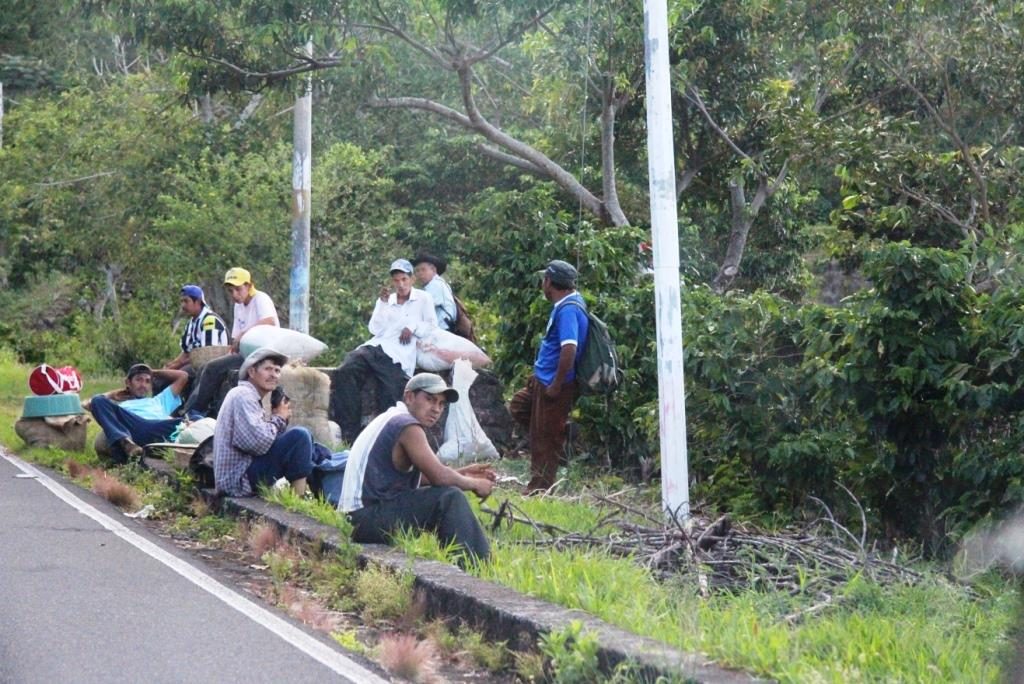
Men and women laborers carry 100-pound sacks of coffee in the hills where they now rest.
Father Rutilio Grande came to our parish and talked about liberation theology. He and Father David Rodriguez from the Tecoluca parish in San Vicente were organizing the youth to be catechists to do Bible reflections as well as be evangelists in Christian base communities. I approached Father Rutilio for advice on how to handle the injustice of the workers’ salaries that I was observing. He agreed it was a serious problem and gave our group a Bible text to read. He told us to compare ourselves to the Biblical character in the text, and then return the next meeting with our own ideas of how to resolve it.
The workers were having other difficulties as well. These hard-working campesinos who worked to give the large landowners financial profits were treated as less than human. Their day’s food for working long hours in the fields often consisted of ONE tortilla made of the poorest grains of sorghum (NOT even corn) with a few beans mixed with cockroaches and pieces of rat which the poor workers had to pull out before they could eat them.
Our group of youth decided we could do literacy and health care campaigns to help the campesino workers. If we taught them how to count to 100, they could not be cheated on their wages. We taught them to write their signatures and basic literacy.
My parents did not know I was involved in this because we taught the campesinos after our regular mass with Father Rutilio and Father David Rodríguez at night.
Landowners did not take kindly to their workers’ counting their pay or signing for it using a signature rather than a fingerprint (they forbad them from signing). They became highly threatened when their workers, who became aware of their injustices, began to protest their unfair treatment. This resulted in truckloads of National Guardsmen appearing on paydays. Persecutions then began.
In 1976 the oppression became more frequent against students and campesinos, against the priests, nuns, and catechists. Disappearances and death threats became common. A National Guardsman kept harassing my dad by saying that he had a rebellious daughter; Dad denied the accusation by saying I was a hard worker at his store. My dad had a higher status and more respect than most in our community, so we didn’t take the threats too seriously at first. When we would hear the dogs bark at night, we knew the Guard was coming to take someone, so we would ring the church bells to bring everyone out in an effort to prevent it. The community above us would set off fireworks to warn us the Guard was in the area which allowed us time to run to the mountains to hide.

Father Rutilio Grande
Then Father Rutilio was killed in 1977. That event transformed Father Romero, his close friend, who later became archbishop, into a stronger voice. Instead of frightening us, the oppression convinced us to become more organized. We began organizing ourselves into unions and movements based on our demographics. We were workers, students, all groups fighting for the common rights of all. We refused to give in to the terrorizing. But the persecutions became much worse. Huge massacres took place around the country, including in our village and the village above us. In our village everyone who was not killed during that massacre, including two of my brothers, migrated to the U.S. the following day. The army was doing forced recruiting, and my brothers did not want to join. We survivors are forever marked by this massacre and torture.
Even though I tried to hide the fact that I was involved in the social movements for a long time, I could no longer cover it up. My husband was also active in the social movement, which was a movement for social justice and to resolve the social problems that plagued our communities with respect and dignity. He was captured and “disappeared.” (Thousands of Salvadorans went missing during the war, joining the ranks of the “disappeared” whose final resting place remains a mystery and whose families continue to hold on to the hope that they may still be alive). We had two daughters and I was pregnant with our third child when he was disappeared.
It was at noon on December 26, 1979, at the local market where I had just spent 500 colones to purchase sugar and other items for our store when the National Guard captured me and charged me as a subversive.
The only crime was guilty of was being organized in fighting for human rights. We weren’t an armed movement. We were a civil society organizing for our rights. Until I was 15, we had a good life. From 16 to 20 years old, my life was full of persecution. Everyone at the market knew me and denied the charges and argued that I was a hard-working person. However, that did nothing to prevent the horrors to come.
The Guard placed me in the basement of a clandestine prison and tortured me for two grueling weeks. It is still too difficult to repeat all the details, but briefly, the torture included electric shock, boiling water, suffocating me with a bag over my head with limestone in it, repeated rapes, burning with cigars, ripping out my fingernails, and forcing me to watch others being tortured, and nearly drowning me time and time again before pulling my head out of the water by my hair. I was eight month’s pregnant.
Psychologically I tried to keep my spirits focused by recalling Father Rutilio’s warning to us that we would need to fight for our dignity and would face serious problems. He cautioned us that, as Jesus modeled when he fought against injustice, we should never abandon our brothers and sisters. I refused to turn in other catechists because together we were fighting injustices. We knew we were leaders of communities defending human rights. Our only crime was having an opened consciousness, awakened by the knowledge of liberation theology. Fighting against repression allowed us to be humans with feelings. If we didn’t have this consciousness and if we hadn’t become organized, we would still be asleep and sedated. The authorities would still be smashing us without our defending ourselves.
After they finished torturing me, the Guard left my body in a garbage dump in San Vicente, thinking that I was dead. That is where I gave birth to my son, who was forced to be born before his time because of the torture. Nuns, priests, and community members searched the streets and the human garbage dumps early every morning for bodies to identify because the National Guard was capturing, torturing, and killing people daily and leaving their bodies cut to pieces in human garbage dumps. These people would try to identify the bodies and figure out where they were from. One of them heard my baby crying while I was in a coma and realized I was still alive. I have no memory of this. My baby son later died.
People from San Vicente identified me as a catechist and brought me to San Salvador to a clandestine house operated by Enrique Álvarez Córdova, whom I knew personally and who assumed the cost of my medical care. Thanks to him I am alive. Later I recuperated at a convent, and throughout this whole time I was in a vegetative, comatose state.
(Enrique’s family consisted of wealthy local landowners, but he was sympathetic to campesino workers and treated his workers fairly and respectfully because he valued their work. Enrique worked for agrarian reform on their behalf for the government before he, too, was killed because his views were unpopular and not shared by most wealthy landowners.
We were fighting a just fight for change. We wanted an improved quality of life and dignified salaries. We wanted to be included and not seen as ignorant, exploitable people to be repressed and oppressed. As a young girl I wanted only to help campesinos read and write. I still never accept that I was tortured for this reason, nor that my son was tortured and assassinated in the womb because I taught campesinos how to read and write. I wasn’t armed. I wasn’t a guerrilla. The guerilla didn’t even exist yet in 1979. There were armed groups but I didn’t even know about them at this time; I was simply a catechist organizer for the Christian base communities. I didn’t know anything about armed groups at the time. I didn’t understand why rich people were exploiting the poor. This was my big question, and I always asked my grandmother this question and she’d say, “look my child, those sons of a thousand bitches don’t have human feelings, they are dangerous and good for torturing and killing people with their eyes closed and hands tied.”
Archbishop Romero was receiving constant death threats for his solidarity with those involved in the social movements. He was well aware of the violence and its links with the financial aid from the U.S. government, prompting him to write a desperate plea to President Jimmy Carter begging him to stop the killings against the civilian population of the country. Carter did not respond. (The amount increased exponentially during the Reagan years, averaging 1 million dollars in military aid per day over a 12-year period.) On March 24, 1980, Archbishop Romero, too, was assassinated.
I have come to learn later that it was more than financial aid from the U.S. that kept the war going for 12 years. The oligarchy made a business deal with the U.S. before the war ever started to fund the war in order to keep the exports flowing. War is simply a dirty business deal. Salvadoran soldiers were being trained both in Panama and at the School for the Americas (SOA) at Fort Benning, Georgia, to come here to kill us. All kinds of specialized command forces and battalions trained to persecute and repress were trained at those locations. It was that training that led to the massacres of the people who worked for the oligarchy producing the products on their plantations. (Roberto D’Aubuisson, the intellectual author of Romero’s assassination who formed the death squads, nicknamed “Blowtorch Bob” for his favorite torture device, studied at the SOA in Georgia where the courses include interrogation techniques, torture, kidnapping, and execution all in the name of “foreign policy.” It remains open under the name “Western Hemisphere Institute for Security Operations” despite watchdog efforts to close it down, and a satellite school of the same kind was recently completed in San Salvador.)
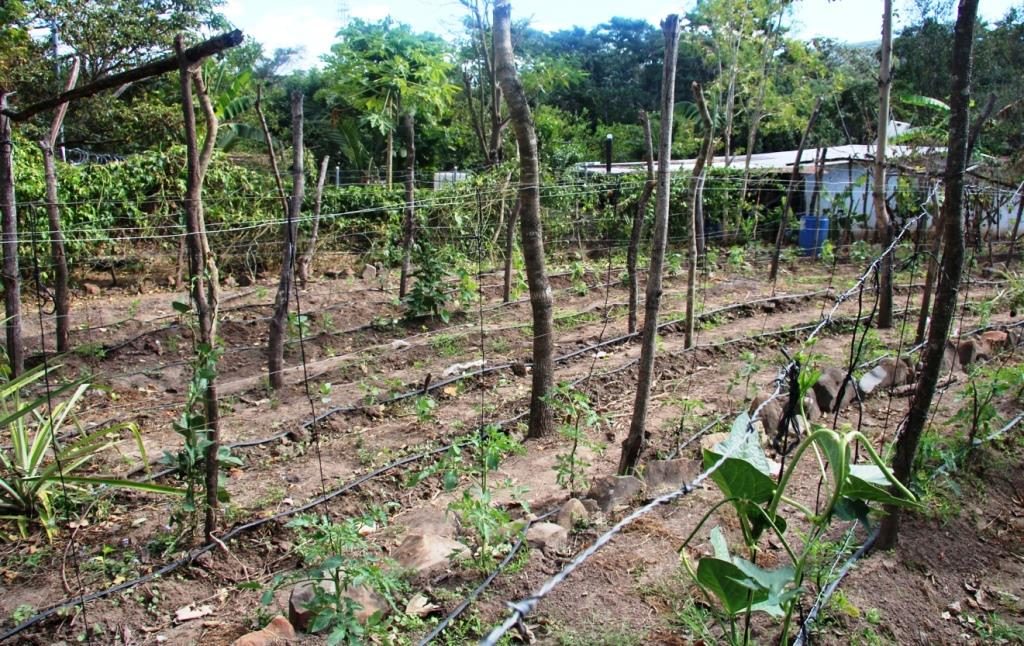
Trinidad Olmedo & Jamie Stark worked with Neris and developed this organic garden overseen by people who have only the streets on which to live. The food is shared with the downtrodden.
After the war the country was full of trauma. Whole communities returned from Honduras, the mountains, or wherever they left to flee for safety and needed people to accompany them to rebuild and reinsert themselves. Church groups, advocacy leaders, and NGOs helped fill this role. Two of those special people in my life are Jean Stokan and Scott Wright. They helped arrange for me to get a visa and treatment in Chicago at the Marjorie Kovler Center, which specializes in treating survivors of torture. I left in 1997. The evaluation itself took a full year, and I spent several days a week receiving therapy consisting of psychological treatment, massage therapy, etc. Because I discovered the treatment was going to take much longer than I originally expected, I fought for political asylum in the U.S. I spent eleven years in Chicago continuing treatment and also working. One never heals from torture, but therapy helps alleviate much of its lingering trauma. I find it paradoxical that people who tortured me went for training to the same country (U.S.) that I did for healing.
I met Father Carlos, the priest in my Chicago neighborhood, and he gave me a room at the ex- convent. It was important to me that I have my own space at that time. I shared my observations with him of Pilsen, of my newly adopted immigrant neighborhood, that appeared so similar to El Salvador in terms of social needs. Youth were dropping out of school, they were obese, and they had social issues. People were eating out of dumpsters searching for food. I told Father Carlos I wanted to teach a class on ecology to raise awareness. He said, “You are crazy. Who will understand it?” I was undeterred and insisted, “That’s why I need to teach it.” He agreed to allow me to do what I wanted. I taught nutrition and organized social projects.
This teaching evolved into ECOVIDA, an organization I founded to promote sustainable agricultural methods and support small farming communities. The kids began learning how to grow city gardens and how to compost. I enjoyed teaching and could relate to the students. I taught an “After School Matters” program approaching the topic of the day by incorporating theatrical performances, music, food, and talk about their ancestral roots, all treated in a playful spirit before getting into the day’s lesson. I taught ecology and natural medicine. I wanted them to understand the proper values in eating habits. We dealt with inter-racial issues. We didn’t use the term “gang” but instead addressed “social problems.” We went on summer camps with kids across state lines and were well known at the national level. Seven organizations helped fund this program. All the while I worked on the ECOVIDA program and received my own treatment, I was also working to win my political asylum case, as well as my case with CJA, (Center for Justice and Accountability) which was handling the legal case against the two generals responsible for my torture. Winning that case opened the door for others to seek justice against criminals who had violated their human rights.
It was extremely hard to leave Chicago. However, my mom became very sick, and I needed to return to El Salvador to care for her. She died of kidney failure two years ago. Also, my sister has special needs, and I must now care for her.
Sometimes I feel broken down because we’ve fought so much and because so many people were disappeared, killed, and tortured. Only hope and faith motivates you through that. We need changes in our country and now have a political party in power that we hope can make changes by including the opinions of the most humble people in our communities. We need a government that will be inclusive and integrating and that knows how to listen with great attention to the voices of those on the margins, and we need people who can understand what our country really needs to move forward.
I will always believe in change, and now as a social worker, we are change agents trying to work for change in our communities and project a new future for our country. This hope motivates me to keep fighting to help people by organizing them and raising their social consciousness. I believe in integral human development and I have a great deal of faith in the development of agriculture, but of an integral agriculture like that which Enrique Álvarez Cordoba dreamed of in the agrarian reform he supported.
I have faith that with the FMLN party in power, it is just the beginning of this social change, but it’s not easy when we cannot abolish our current justice system in order to have honest lawyers and judges who are not corrupt and who would work justly for the working class. There has been so much corruption under miserable circumstances, and it is not easy to break structures that were put into place. We have serious social problems. We have courts that are not doing justice. No structures are in place to allow for easy change. If there is no justice, there will be no change. Criminals hold state positions in the legislative assembly, so no true peace and justice will occur while they hold positions of power. I hope that one day amnesty will be overturned. All criminals need to be put on trial. I have faith the FMLN can do this. Without justice there will be no true peace or social change.
After the war I could not talk about my situation. The therapy and the court case have helped me. If we don’t heal, we can’t find peace. I still feel grief for my lost friends, but I carry their lives on my back; this keeps me committed to all of those who died. I like working in refugee camps with the youth who had so much trauma. I have a vision to start gardens to help people see that things can be different. Helping here in my community helps me continue to go forward with my life. Without the therapy from the Kovler Center, I would never have been able to do that. During the trial I asked God to help me be strong to face the torturers. I kept fighting because I reminded myself I never held a gun in my hand, only a Bible in one hand and fruits and vegetables in the other. It was a social movement. Anyone who had anything to do with the health and education systems was tortured, massacred, and disappeared.
I recently received my degree in social work from Lutheran University at the age of 59. I have been involved in many groups including protesting at the SOA and participating in a torture survivors group in Washington, D.C. called TASSC (Torture Abolition and Survivors Support Coalition). I am convinced of the power of healing gardens and I want to start a project in my country that involves healing through the therapy of organic gardens. I know from experience that this has helped me heal and I have hope that one day I can have a space where I can use this type of therapy to help my people, who are now getting old and dying because of the trauma from the war and the modern day trauma of living in a country with so much gang and state-sponsored violence against the most vulnerable people. I always cling to the “precious faith” that Rutilio taught us to always have with us, not just “useful” faith, but precious faith. This is a profound faith in our own intelligence, creativity, and capabilities. It is one that nourishes us spiritually in mind and body, and is much more than a faith that merely asks for miracles during times of anguish.
Currently I work in the Ministry of Foreign Affairs in a program that is designed to strengthen local economies for women in rural regions by empowering them to be productive and independent businesswomen so that they do not have to immigrate. One of the areas I most enjoy is women’s empowerment. This year women started making school uniforms in isolated areas of their own homes with the help of industrial sewing machines donated from organizations in the United States. Another six groups of women are coming together to grow sprouts in a greenhouse for an agricultural project thanks to funds from the Ministry of Agriculture. These days, there are more rural students are attending universities. They will be the ones to decide how to transform rural municipalities. With adequate academic training coupled with training in restoring their rural culture and agriculture, they will transform their communities.
My grandmother was creative and taught me work ethics. She worked right alongside of us. Thanks to my grandmother I like to work and I’m creative. I don’t care how old I am when I die as long as I have strong bones to carry me. My grandmother lived to be over 100 years old. I feel as if she never died because she is very much alive in me. I too am a grandmother. My daughters both live in the U.S. as do my grandchildren.
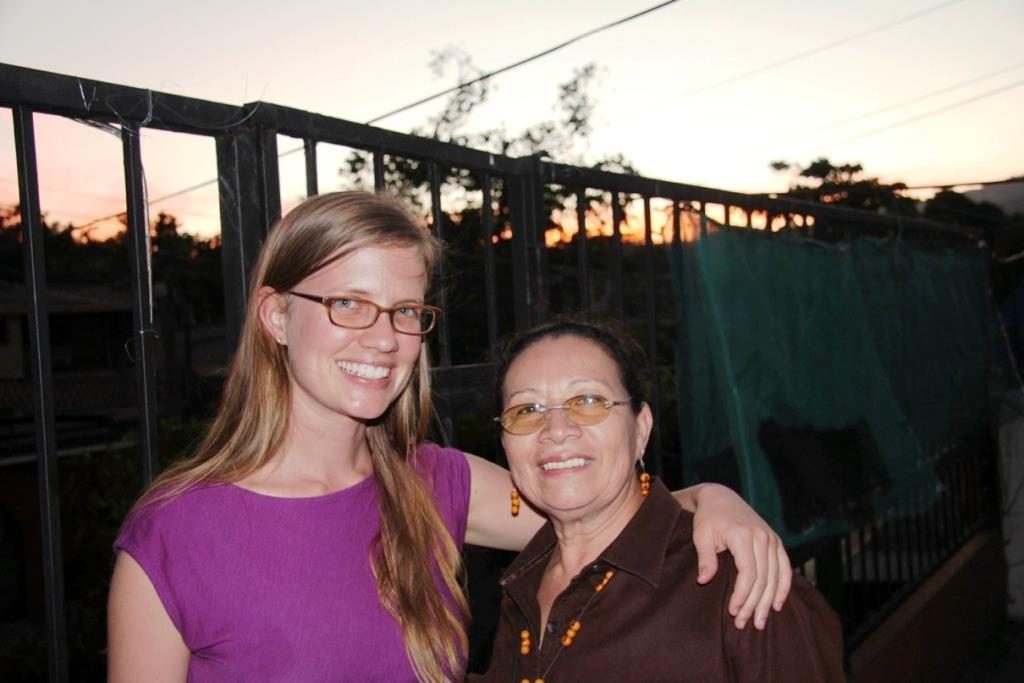
We are deeply indebted to Jenna Knapp, a friend to Neris, for sharing and making this story possible. The raise our vision and strengthen our hope for the best in humankind.
Editor’s Note: Neris credits Enrique Álvarez Córdova for saving her life after her torture. We talked at length about the fantastic book Don and I both read about him, Enrique Alvarez: Life of a Salvadoran Revolutionary and Gentleman, by John W. Lamparti. Neris is a friend of this author. We highly recommend this book for its history of the country and his life.
Besides her beloved grandmother, I understand that Neris patterns herself after Brazilian Paulo Freire, born in 1921, who also championed the poor and oppressed. He embraced an unorthodox form of liberation theology and taught sugar cane workers how to read and write at a time when Brazil required literacy to vote. To him, public education was the basis for social change.
Neris thanks us… “for what you are doing with your project. They don’t do this here in my country.” She validates our work in documenting the stories explaining that in many small communities including her own during the civil war, there were no photographers or media to document the massacres taking place. She adds, “If we do not read and we forget about our historical memory, current generations and those to come will repeat the same painful history. I insist that we never forget our historical memory and that we continue to fight for justice and for the integral social change that our country so deserves, after years of torture, corruption, and human rights violations. Education is the backbone of a developed country; without justice, we cannot talk of peace.” Our help now, even years later helps preserve this historical memory.


